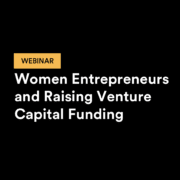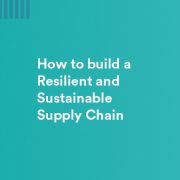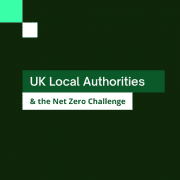Women Entrepreneurs and Raising Venture Capital Funding – Webinar
Hosted by Enterprise Ireland and the Irish Venture Capital Association, this is the second “Women Entrepreneurs and Raising Venture Capital (VC) Funding” focuses on encouraging women-led companies to seek venture capital finance.
The purpose of this webinar is to support companies in all sectors and at all stages of growth that are seeking venture capital finance. There is a specific focus on encouraging and enabling women entrepreneurs to successfully raise VC finance.
It includes panel discussions with women funders and founders, which identifies and provides examples of successful fundraising strategies.
Recognising the under-representation of women in this space, the webinar is targeted at women-founders and co-founders in all sectors and at all stages of growth.
It provides a roadmap for women founders on their investment journey who wish to develop their investment skills and network with other women funders and founders.
Building resilient and sustainable supply chains to future-proof Irish business
Having weathered the storms of Brexit, global trade divisions, the Covid-19 pandemic and energy inflation, the next challenge for Irish exporters is to future-proof their business by developing resilient and sustainable supply chains.
This will require rethinking supply chain strategy and adhering to new EU legislation on corporate sustainability reporting. The challenges and potential solutions involved were analysed at the ‘Building a Resilient and Sustainable Supply Chain’ webinar, the first webinar in the Client Solutions event series.
Pain-points and solutions
“The Covid-19 pandemic and other events have seen companies fundamentally re-examine their supply chains and certain themes have emerged including localisation, diversification, digitisation, sustainability and Just-in-Time versus Just-in-Case,” said Mike Hogan, Senior Executive Global Sourcing, Enterprise Ireland
Mike’s presentation focused on supply chain pain-points and solutions identified by Enterprise Ireland client companies.
Localisation and ‘Alt Asia’
“As companies begin to ‘nearshore’ more they’re beginning to look at what our local is and local for Ireland in many cases is two to three hours flying time or accessible points by sea from Ireland,” said Hogan.
Local also means looking to suppliers in the Balkans and the North African ‘Mediterranean Lake’ countries such as Morocco and Egypt. The new post-Brexit ferry and cargo routes into France, Holland and Spain “have opened up opportunities for a lot of our clients to examine new suppliers,” added Hogan.
And as labour costs rise in China, some businesses are reducing their dependence on China and looking to what are termed the ‘Alt Asia’ countries such as Vietnam (production) and the Philippines (back-end services) for suppliers. “While they may not be able to supply all the aspects of China in terms of a one-stop-shop, suppliers in these countries can be combined to bring together the necessary inputs that people require for their businesses,” said Hogan.
“The key takeaway from our clients is that they are looking at combining longer and shorter supply chains and also that supply chain management is a continuous activity. It’s not something you do because you lose a supplier – it’s something that should be going on in the background on a continuous basis.”
“The key takeaway from our clients is that they are looking at combining longer and shorter supply chains and also that supply chain management is a continuous activity. It’s not something you do because you lose a supplier – it’s something that should be going on in the background on a continuous basis.”
Diversification and ‘Just-in-time’ versus ‘Just-in-Case’
Some Ireland client companies are beginning to reduce their over-reliance on specific suppliers. “Here we’re seeing examples of companies engaging with additional suppliers at a lower level to keep them on standby,” said Hogan.
He also predicts a shift from the ‘Just-in-Time’ supply strategy that has held sway for decades towards a more ‘Just-in-Case’ approach. Companies are holding additional inventories to reduce risk, but this also creates challenges around raising capital and inventory management, he cautioned.
Resources for sourcing new suppliers
The Enterprise Ireland Market Research Centre should be the first stop for companies looking to source new suppliers, said Hogan. He added that trade shows, the commercial sections of foreign embassies based in Dublin and London, Chamber of Commerce networks in Eastern Europe and North Africa, and specialist British trade bodies are also valuable sources of leads.
And he emphasised that given the multinational profile of the Irish workforce, companies should look at tapping into their own reservoir of talent to liaise with suppliers in their employees’ native countries.
Sustainable supply chains
The impact on supply chains from climate change was addressed by Ingrid de Doncker, Co-founder and Head of Innovation, Future Planet.
“Climate change is the biggest challenge for this generation of business leaders to solve. The future of our businesses and the planet is in our hands. It all comes down to responsible production and consumption and how we can source and buy products and services better.”
“By embracing sustainability in supply chains, we not only secure a better future for our planet and society, but also create more resilient, innovative, and profitable businesses.”
De Doncker also outlined how new EU legislation on corporate sustainability reporting will impact how businesses operate.
“It’s going to be the most challenging business transformation we will ever see,” she said, adding that “an unstoppable legal train has left the EU station.”
The Corporate Sustainability Reporting Directive (CRSD), which came into force in January 2023, will require EU-based companies to strengthen and standardise their sustainability reporting from 2025 onwards.
The directive aims to eliminate greenwashing, and companies that fall under the CRSD will need to prioritise their sustainability reporting strategy around five key areas, said de Doncker. These are:
- Double materiality This involves looking inwards to assess sustainability risks to the business and its impact on environment & society.
- Looking both ahead and back Companies must provide retrospective and forward-looking sustainability analysis in their financial and management statements.
- Stricter rules around climate-related disclosures in particular disclosure of Scope 3 emissions.
- Third-party assurance Sustainability information must pass through an external audit process before publication.
- Digital data and tagging Companies must prepare financial and management statements in XHTML or electronic format in accordance with the EU taxonomy.
The CRSD will be introduced on a phased basis, beginning with companies and public interest entities already subject to the EU’s Non-financial Reporting Directive (NFRD). By 2027, all companies with 10 or more employees will need to be CRSD-compliant.
For now, said de Doncker, companies should consider two fundamental questions when planning their sustainable supply chain strategy:
- How will you adapt your business model and your supply chain to reduce the impact of climate change?
2. What measures will you take to mitigate the impact of your business on the environment and society?
To adapt or mitigate your business and your supply chain to climate change, your first port of call is assessing and improving these related material challenges:
- Sustainable Procurement
- Green Logistics
- Human Rights and Stakeholder collaboration
- GHG Scope 3 Management
- Circular Economy and End of Life Waste
- Sustainable Product & Packaging Design
Building a resilient and sustainable supply chain is not always easy, but always worthwhile. To ensure transparency, collaboration across the supply chain and compliance to reporting standards, ESG enabled software can guide the journey to sustainable growth to Live Better in your business, Buy Better from your supply chains and Design Better for your customers.
Building a Resilient and Sustainable Supply Chain
Building a resilient and sustainable supply chain was the first in a series of Client Solutions events and webinars being hosted by Enterprise Ireland. The webinars offer practical solutions to the acute challenges facing businesses.
To register for upcoming events and to watch the recordings, visit Client Solutions Events
Net Zero UK – UK Local Authorities & the Net Zero Challenge – Webinar
The UK’s 408 local authorities will play a crucial and defining role in the UK’s net zero challenge with responsibility for:
-
overseeing the adoption of innovative zero carbon technologies
-
investing in climate-resilient urban infrastructure
-
driving energy efficiency through building retrofitting
-
placing a greater emphasis on environmental criteria in procurement policy
This Enterprise Ireland UK webinar discusses how this evolution is reflected in procurement practices, with local authorities giving increasing consideration to social value and carbon emissions and what this means for Irish SMEs in the sector.
Speakers include:
-
Todd Holden, Energy Policy & Programme Lead, Greater Manchester Combined Authority
-
Steve Turner, Business Director, Connected Places Catapult
-
Bret Willers, Head of Climate Change and Sustainability, Coventry City Council
-
Christopher Hammond, Network Membership Director, UK100
Gain key business insights with our on-demand UK webinar series
Start-Up Showcase: Demonstrating Ireland’s strength in supporting entrepreneurs
Events over the past few years have made the business environment challenging to navigate but have also presented some unprecedented opportunities for Ireland’s innovative and dynamic entrepreneurs.
Enterprise Ireland’s aim to support start-ups
In a rapidly changing world, innovation is vital, making it so important for Enterprise Ireland to nurture and support promising ideas and those who produce them.
“We have a hotbed of talent and innovation in Ireland right now, so it’s more imperative than ever that our entrepreneurs are given the time, funding and advice to excel on a global scale,” says Jennifer Melia, Divisional Manager, Technology and Services Division at Enterprise Ireland.
“At Enterprise Ireland, we aim to support and enable Irish businesses to lead in a changing world – and an integral part of this is those ambitious start-ups with innovative solutions to tackle global problems.”
125 start-ups attend Start-Up Showcase 2022
Our strength in innovation was recently demonstrated in Enterprise Ireland’s 2022 Start-Up Showcase, which was held in the Aviva Stadium on Thursday, 7 April.
Making a welcome return in person – last year’s Start-Up Showcase was wholly virtual – the event was attended by the ‘Class of 2021’. This included 82 new High Potential Start-Ups (HPSUs), 43 approved Competitive Start Fund companies (CSFs) and representatives from each of the 32 New Frontiers programmes we supported during the year.
This number was on a par with previous years; considering the difficult business environment in 2020 and 2021, this is testament to the resilience of Irish start-ups and entrepreneurs.
Interestingly, and reflecting Enterprise Ireland’s commitment to supporting diversity in leadership teams, 24 of the 82 HPSUs and 16 of the 43 CSFs were led by female founders.
Learning from other success stories
“Investment and funding is only part of the recipe for success for a start-up,” explains Jennifer. “Learning from peers and those who have been on the starting and scaling journey already plays an important role in future success.
As a result, this year’s conference element at Start-Up Showcase aimed to tackle two of the most important subjects for start-ups.
The first panel focused on ‘Disruption and Customer-Led Innovation’. It featured Silvercloud Co-Founder and CEO Ken Cahill, Novus Diagnostics Founder and CEO Elaine Spain, and ACT VC General Partner John O’Sullivan.
Centaur Fund Services Founding Partner and CEO Karen Malone, Kyte Powertech CEO Stephanie Leonard and Cubic Telecom CEO Barry Napier then shared their experiences on ‘Building a Strong Team and Funding for Scale’.
The conference then ended with a keynote speech from LearnUpon Co-Founder and CEO Brendan Noud as his company, a HPSU from the Class of 2013, goes from strength to strength.
Returning to an in-person Start-Up Showcase event
Due to the public health measures, last year’s event was wholly virtual due to the ongoing Covid-19 pandemic. But this year’s was both live streamed and in person.
“As the start-ups would have begun their journey during lengthy lockdowns and travel restrictions, this event, in many cases, was one of the first opportunities to meet such an influential group of people – as well as their peers – in person,” says Jennifer. “There was a real buzz in the air.”
“In total, there were 500 attendees including representatives from the Irish start-up ecosystem, including VCs and other funders, State support agencies, strategic company partners and professional and financial services, Government departments, academics, business mentors and Local Enterprise Offices.”
Innovation and resilience among the Start-Up Showcase Class of 2021
As companies that formed during the second year of the pandemic, the ‘Class of 2021’ have shown innovation and resilience like never before. Proving that Ireland is the “go to” country when it comes to finding global solutions, these companies produced a number of solutions in many sectors, including digital health, fintech, medtech, software, sustainability and more.
“The ‘Class of 2021’ is really impressive,” says Jennifer. “Take a look at Amnexis Digital Solutions, based in the Guinness Enterprise Centre, a digital health company that records patient data efficiently, therefore reducing the administration workload on hospital, homecare and nursing home staff.”
And there’s more to come. Although we are only a few months into 2022, already the easing of restrictions has resulted in a renewed energy in Ireland’s start-up community.
“Next year’s Start-Up Showcase is looking promising even now, with a strong pipeline of promising entrepreneurs with intriguing prospects making waves across Ireland, both first-time and repeat entrepreneurs.”
The future has never been more exciting for Irish entrepreneurs to Lead in a Changing World.
Find out more about Enterprise Ireland’s supports for High Potential Start-Ups or watch the recording of the Start-Up Showcase 2022 conference.
Using market intelligence to inform your export plan
The saying that ‘knowledge is power’ is certainly true of successful exporting. Companies must understand their customers’ requirements, cultural considerations, market trends and what competitors in the market are doing, in order to succeed.
Insights gained from high-quality market research are essential for good business decisions for companies with the ambition to grow, export and, indeed, survive. While successful products and services are built on sound market research, a continual process of keeping up-to-date with business intelligence is required, which can be time-consuming and costly.
Market Research Centre
That is one reason Enterprise Ireland’s Market Research Centre is such a valuable resource. It is the largest repository of business intelligence in Ireland and contains thousands of world-class market research insights, available to Enterprise Ireland supported companies.
Reports include company, sector, market and country information, which help businesses to explore opportunities and compete in international markets. We use databases from blue-chip information providers such as Gartner, Frost & Sullivan, Mintel and others, which provide authoritative, verified information that is independent and reliable. Some of these reports cost tens of thousands of euro individually, so the value of accessing the service is immense.
Using market intelligence to assess new markets
The Market Research Centre is staffed by eight information specialists who help clients locate the most appropriate sources of knowledge for their requirements. The specialists can track down niche market intelligence that is not available through internet research and can also facilitate access to industry analysts to provide bespoke briefings that deep-dive into subject areas.
While the UK and European markets remain vitally important for exporters, increasingly diversification into more distant markets is a strategic option. Critical to all such business decisions is access to authoritative market research.
Using insights to make an impact
An example of how the centre helps companies to explore opportunities in overseas markets is workforce travel company Roomex. Over the last two years, the company has targeted the UK and Germany and is now looking at the huge potential of the US market. Information specialists helped the company gain valuable insights by providing access to global company, country, market and sector data which helped the Roomex to analyse their target customer and competitor base.
Enterprise Ireland’s research hub offers access to extensive predictive research on future trends, which is invaluable for companies interested in innovation. Knowledge of what might impact a market next provides an opportunity to develop new products or solutions. There are huge opportunities arising from disruptive technologies, such as driver-less cars, but also risks to companies which are not looking ahead
Growing your business
Companies which are serious about exporting, growing and future-proofing their business should put continuous research at the heart of their strategy. If your company is considering expanding into new markets the Market Research Centre’s extensive resources and expertise should be your first port of call.







